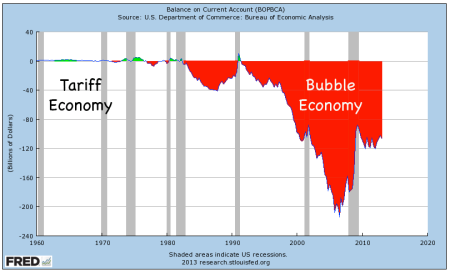The theory of free trade is that everybody benefits when individuals and corporations based in different nations are allowed to buy and sell goods and services without restriction.
 Unfortunately most of the world operates on a different theory—that the exchange of goods and services should be to the benefit of the nation, not the corporation or the individual.
Unfortunately most of the world operates on a different theory—that the exchange of goods and services should be to the benefit of the nation, not the corporation or the individual.
Subcontracting of manufacturing by, for example, Apple Computer to the Chinese company Foxconn is of mutual benefit to Apple and Foxconn, but it is not of mutual benefit to the USA and China as nations. It is China’s gain and America’s loss.
Governments of China, Japan, Germany and other countries regard regard the unit of international economic competition as the nation rather than to the individual or the corporation. They don’t care about the economic benefit to the trading partners. They’re concerned about the economic benefit to the nation as a whole.
If an American corporation wants to do business in China or Japan, its executives have to provide something that benefits the Chinese or Japanese economy—a transfer of technology, or the creation of manufacturing jobs.
You have the strange situation of American business corporations dictating policy to Washington while kowtowing to Beijing.

Source: Crooks and Liars.
I don’t think economic nationalism is a good solution to the problems of free trade. Economic nationalism consists of trade policies aimed at keeping your country’s trade balance in surplus.
The problem with mercantilism is that for your nation to be in surplus, some other nation has to be in deficit. After a certain point, the deficit nation is too far in debt to be able to afford to buy your products.
That is what is happening now in Europe with Germany and Portugal, Italy, Spain and Greece. It may well happen with China and the United States.
Rather the goal of trade policy should be to keep trade in rough balance over time.
Governments should repeal, amend or withdraw from treaties that limit the power of governments to protect infant industries, to protect industries vital to national security, to protect against dumping of products below cost and to protect financial markets against international speculators.
Such agreements include the World Trade Treaty, the North American Free Trade Agreement (NAFTA) and the proposed Trans Pacific Partnership agreement.
They could be replaced by bilateral reciprocal trade agreements. That’s not to say all bilateral trade agreements are good. They aren’t. But it is easier for two governments to determine what their people specifically need than to set one-size-fits-all international rules.
Such agreements should follow the principles of fair trade purchases by individuals and groups in the USA and other countries. These groups agree to buy, for example, coffee directly from producers that either are worker-owned co-ops or known the treat workers fairly.
They save some money by bypassing the middleman, but fair trade coffee is generally more expensive than free trade coffee. It is, however, not so expensive that it is not affordable. It is not based on an exchange in which the richer and more powerful parties maximize the benefit of trade, and the poorer and weaker parties accept a bare minimum.
Prosperity for people in other countries is a good thing for us Americans, not a bad thing. The better off people are, the more able they are to buy things that we make.
One way to keep trade in balance is to allow the exchange rates for national currencies to fluctuate. Exchange rates for currencies of nations in trade surplus will increase, making their goods and services more expensive in international commerce. Exchange rates for currencies in trade deficit will fall, making their goods and services cheaper.
There would need to be some protection against international speculators trying to manipulate currency exchange rates, but over time exchange rates should be allowed to reach their natural level.

One final note: Many problems attributed to free trade are really due to the fact that most or all of the benefits of trade flow upward to a tiny economic elite. Change that, and free trade will be easier to defend.
Tags: Economic Nationalism, Fair Trade, Foreign Trade, Free Trade, trade agreements
March 10, 2016 at 7:28 pm |
Reblogged this on necltr and commented:
Promoters of trade deals want to fast track our country into serfdom under global tyranny.
LikeLike